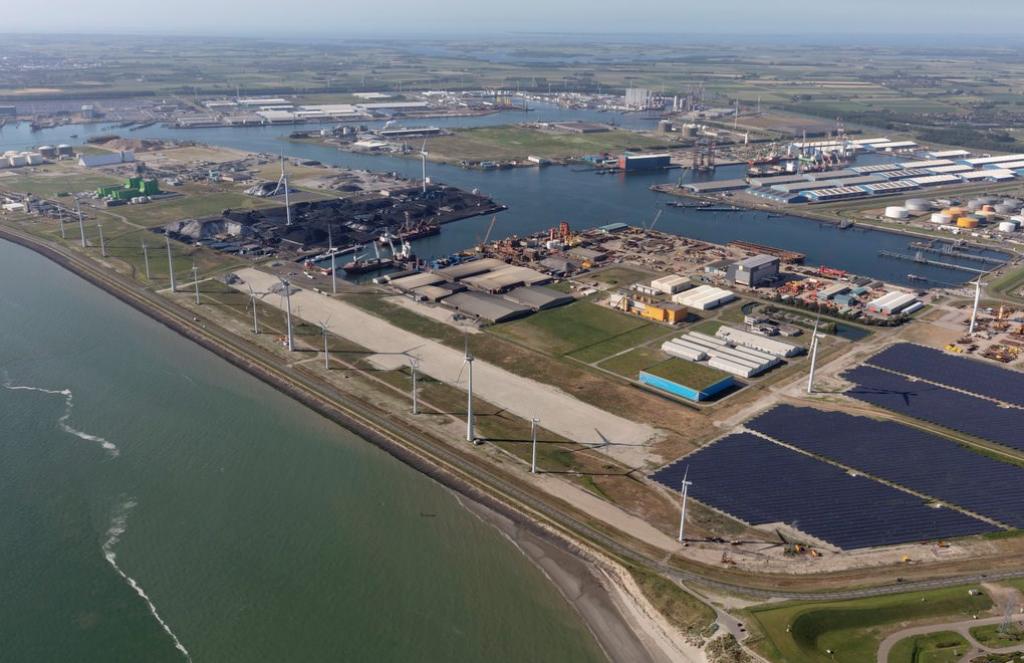Thessaloniki gets ready for its metro launch in November
The underground rapid transit lines have been under construction for almost two decades due to various project delays
 TheMayor.EU logo
TheMayor.EU logo 
The port generates renewable energy that would also help to decarbonise industry, Source: North Sea Port
A Carbon Hub at the port of Ghent will help fill tankers with liquefied carbon emissions. The latter will then be sent to where they originally came from – under the ground
Yesterday, authorities in the North Sea Port in Ghent, Belgium, announced a new project for creating a massive carbon capture facility. The aptly named Carbon Hub should capture CO2 from port industry, liquefy it and store it in giant silos.
Then, port authorities would use it to fill up tankers and send them back to countries that produce natural gas, like the Netherlands or Norway. These countries would then pump it back into the ground, returning the carbon from where it came from.
According to an official statement from authorities at the North Sea Port, the Carbon Hub should be completed by 2027 and will be able to remove 6 million tons of CO2 from the industry. This amounts to roughly 15% of Belgium’s total industrial emissions.
One of the challenges around decarbonising Ghent’s port is that a portion of it is located in the Netherlands. The Rostijnegeleed canal that feeds the city’s waterways ultimately runs into the mouth of the river Shelda, across the border.
This, authorities say, could lead to some difficulty in financing the project, as it will need to have infrastructure both on the Belgian and Dutch sides. However, they point to a similar carbon capture project in the port of Antwerp, which was able to secure 350 million euros in EU funding.
Additionally, estimates put the total CO2 emissions from port industry at about 22 million tons. The new facility would be able to capture around 6 million tons on the Belgian side and an additional 3 million on the Dutch side, as port facilities there are much smaller. This amounts to around 15% of Belgium’s total industrial emissions.
Port authorities have now launched a feasibility study, to determine the best locations and technology, as well as a more concrete timeline for the project’s implementation.
Daan Schalck, CEO of North Sea Port, was quoted in a press release, examining that the port aims to be climate neutral by 2050 and to halve its emissions by 2030, making this project extremely important for Ghent’s maritime industry.
Are you between 15 and 29 years old? Take a moment to complete a short survey on youth empowerment on this link.

The underground rapid transit lines have been under construction for almost two decades due to various project delays

Now you can get your wine in Talence by paying directly in Bitcoin

That’s because the state has to spend money on updating the railway infrastructure rather than subsidizing the cost of the popular pass

Rethinking renewable energy sources for the urban landscape

The examples, compiled by Beyond Fossil Fuels, can inform and inspire communities and entrepreneurs that still feel trepidation at the prospect of energy transition

Now you can get your wine in Talence by paying directly in Bitcoin

The 10th European Conference on Sustainable Cities and Towns (ESCT) sets the stage for stronger cooperation between the EU, national and local level to fast track Europe's transition to climate neutrality.

At least, that’s the promise made by the mayor of Paris, Anne Hidalgo

The underground rapid transit lines have been under construction for almost two decades due to various project delays

At least, that’s the promise made by the mayor of Paris, Anne Hidalgo

Hostal de Pinós is located in the geographical centre of the autonomous region

Despite its church-y name, the district has long been known as the hangout spot for the artsy crowds

Urban dwellers across the EU are having a say in making their surroundings friendlier to people and the environment.

Forests in the EU can help green the European construction industry and bolster a continent-wide push for architectural improvements.

Apply by 10 November and do your part for the transformation of European public spaces

An interview with the Mayor of a Polish city that seeks to reinvent itself

An interview with the newly elected ICLEI President and Mayor of Malmö

A conversation with the Mayor of Lisbon about the spirit and dimensions of innovation present in the Portuguese capital














